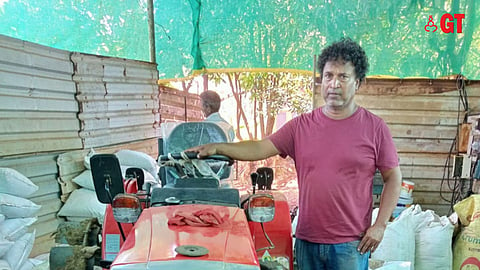

At a time when the Goa government is preparing to foray into the state's hinterlands, it needs to think of sustainable tourism and maintain the quality of the environment of its interior areas.
No one understands this better than engineer-turned-farmer Nestor Rangel, who is all set to start a green off-grid eco-tourism activity at his farm in Valpoi's Dongurli village.
This activity, which is his next immediate plan, will be in line with the farm and student tours that Rangel conducts regularly. These farm trips are well-known and offer a great deal of learning about agriculture.
He believes the way forward for Goa is to adopt organic methods of farming. "We have to know where our food comes from – it's the soil. Organic methods will add value to the soil and keep it free from chemicals," he believes.
All the farming at Rangel's Farm de Goa is carried out using organic-approved materials.
Rangel, who advocates community farming, has mastered the art of working in tandem with nature to cultivate his soil and raise livestock. He advocates that the growth of agriculture will save Goa's land from falling prey to the real-estate mafia.
I prepare lots of organic manure myself, and this goes on to add value to the soil, he mentions, adding, "I have a compost unit where every month I produce 30,000 to 50,000 thousand kilogrammes of vermicompost, farmyard manure and cocopeat."
Rangel, who advocates community farming, has mastered the art of working in tandem with nature to cultivate his soil and raise livestock. He advocates that the growth of agriculture will save Goa's land from falling prey to the real-estate mafia.
He believes Goa has the potential to produce enough paddy for its population.
In the present scenario, he adds, margins are low and the quantity produced is less, which makes paddy cultivation economically nonviable to carry on.
"Community farming or contract farming, in which the rights of landowners are not infringed upon, is the need of the hour," he suggests.
"I help villages take up community farming across Goa and manage to sell 5,000 kg of brown rice every month," he further adds.
Over the years, Rangel has ventured into integrated farming and today has cows, goats and poultry on his farm. He also grows rice, alsande, ragi and maize. Besides that he has 25 acres of a cashew orchard where he distils feni and the seeds are drum-roasted on wood fire.
He also has a mango orchard with 600 trees of 70-plus varieties. Within the farm, there is a nursery where Goan varieties of mango grafts are prepared. After the monsoon season, he also grows exotic vegetables in a hydroponics unit.
Rangel says Goa is not an agricultural state compared to other states like Karnataka and Maharashtra.
There are many good schemes available in Goa, but what is needed is handholding from the department so that these schemes reach target groups. Until then we will have to depend on other states for our daily food needs, he adds.
He says it is important for people to know where their food comes from. It comes from the toil of farmers who take responsibility for both success and failure to grow their crops at a time when Mother Nature and climate are changing at a fast pace, he observes on a parting note.
Rangel has been farming since 2006. He says it is important for people to know where their food comes from. It comes from the toil of farmers who take responsibility for both success and failure to grow their crops at a time when Mother Nature and climate are changing at a fast pace, he observes on a parting note.